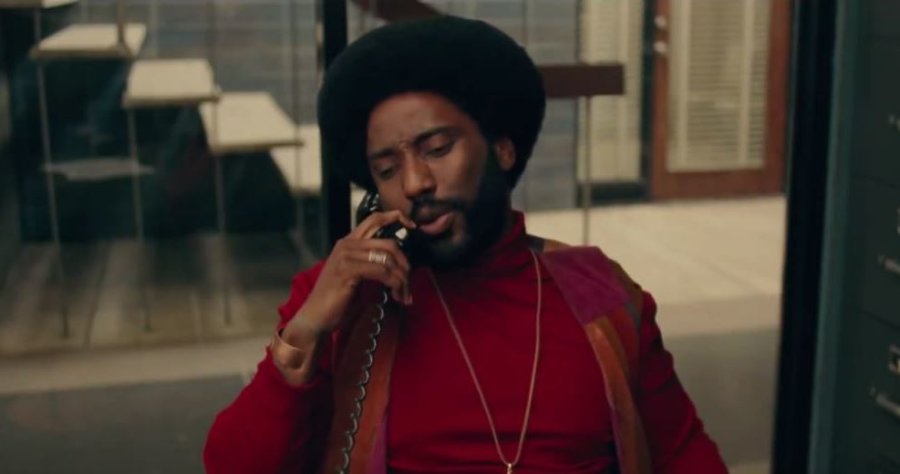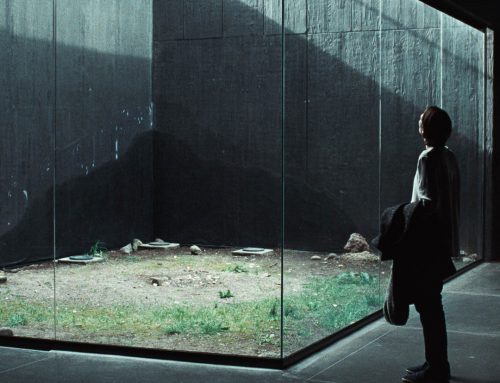“You cannot laugh and be afraid at the same time, and the devil cannot stand mockery.”
Stephen Colbert’s words on election night 2016, or those like them, figured strongly in Spike Lee’s conception of BlacKkKlansman. Colbert wasn’t wrong, it just comes down to how you deliver the punchline.
Based on “some ‘fo real, ‘fo real shit,” an adaptation of Ron Stallworth’s book, depicting here how he, the first black man recruited to the Colorado Springs Police Department, with the help of a Jewish Officer infiltrated and rose up the ranks of a local KKK branch, was always going to happen.
Let’s start with what’s good about this film; the phenomenal first half. Taking no end of inspiration from the Blaxploitation era, John David Washington eases himself ably into the 70’s setting with the first of what will no doubt be many major film roles. Bested only by a now ever-reliable Adam Driver as Ron’s partner of sorts Flip Zimmerman, the early encounters where the pair pull out all the outrageous stops, including both pretending to be Ron either over the phone or in person, are even more hilarious than they are unnerving.
One sequence at this stage involving a prominent member of the black community (played by Corey Hawkins) delivering a speech to a crowd of supporters rates among the film’s best. With Lee inter-cutting seamlessly between members of the audience and Ron, who is undercover, the superimposing of Ron’s face and reactions on the vibrant crowd is Lee’s best and most welcome technical innovation in a feature that is otherwise very traditionally rendered. Returning to straightforward spoken delivery in a later effort to emphasise the ethos and too the antithetical sentiment of this movie, utilising a dramatic cross-cut the filmmakers deploy two speeches from two strongly divergent figures, one a prominent member of the black community, and the other… well, he’s not especially liked in most quarters. Having already used this technique to great effect, its repetitive presence breaks up the dramatic tension as we sit and listen in the added absence of the film’s hitherto comedic bent.
But we can only laugh, and cheer so much. Lee, preoccupying himself and fairly so with the film’s current relevance to contemporary political crises to which audiences everywhere can and may only but relate or empathise, is intent on making his film very much of the now. And he makes sure you know it.
BlacKkKlansman opens with a montage of a far-right figure, played by Alec Baldwin of all people, trying and failing to record a video spouting some vile sentiments against minorities. All but winking at the camera in case we forgot that it’s the guy from Team America who plays Trump on Saturday Night Live, it’s a blunt shot that sets a needless tone for the film.
As characters make all too obvious allusions to recapturing America’s “greatness,” placing “America first” or otherwise expounding on some future President who might adopt some extremists’ awfully divisive rhetoric, you’re left in no doubt as to what Lee, Producer Jordan Peele and co are on about. The effect is ultimately more distracting then conducive to its end. Taking it further, every far-right figure the pair encounter locally, bar one, is depicted as a caricature or otherwise cartoonish. Regardless of the extent to which this is representative of these figures, in a film that does not use satire or extreme hyperbole ala the likes of Blazing Saddles or a straight dramatic edge to highlight the pervasive, corrosive effects of racism, the here distinctive and emphasised effect permits you to laugh at their boorishness in a manner which doesn’t always reckon with the significance and consequence of their rhetoric.
This contrasts markedly with the tone the film is trying to evince at its conclusion where it hurriedly reminds us, using a montage tonally disparate from everything else that preceded it, that far-right groups are still active in America and treated as far from laughable. This also contrasts with Topher Grace’s more considered depiction of one of America’s most widely-known far-right figures. A comic punching-bag and subject of no end of ensuing gags, there is a key sequence in the film where he confronts a character in chilling fashion tragically representative of challenges members of minority communities face.
Showing in seldom beats here the capacity for extremism to harm and agitate those of converse political persuasions, only seconds before and in near the same breath, due to a brazen act from Ron, we are treated to other not unreasonable reactions or forms of protest to such noxiousness; mockery and laughter. It is at this moment, and sparing others, where the film’s comic tone accounts for the severity of its subject. At these instances, BlacKkKlansman is most resounding and indeed you can feel Lee’s considerable skill and anger enveloping the scene.
Tied irrevocably to its crew’s not unobvious views on the state of the USA, an emotive flock of creators or a pointed political message are not in and of themselves detractions for a film, far from it. Audiences who come to see BlacKkKlansman will want that anger; to feel it, to see it articulated and to understand the gamut of ways to respond and address the modern circumstances which this film intendedly reflects. Audiences could easily have sought out a traditionally dramatic piece, the circumstances of which may very well be more relatable, or one of the more outlandishly comic takes on racism in America that in its histrionics and exaggerated state, if necessarily less reflective of modern day, sheds a caustic light on our predicaments as satire so often does. They have however and will continue to seek out these seasoned filmmakers’ account.
Key to both of these forms, at least in the lauded examples, for some of which Lee is well known; the emotive instances, whether they be dramatic or comic, are irrevocably tied to the most pointed commentaries on racism or societal ills. Lee, choosing a style for the most part alternately laugh-inducing and dramatic, in significant tracts divorces the pained, crucial discussions of racism from that which is rendered comically and consequentially just as if not more indelible. Saving much of the heavier content to the very end, the jarring distinctions in tone ill-permit the frequent interludes of hilarity to carry with them the biting social messaging which are the intended crux of this film, nor for them to be delivered in a manner that grants welcome reprieve together with BlacKkKlansman’s most searing agitations.
It is at this concluding junction that the film, utilising news footage, focuses on a recent flash point of racial tensions in one tragically affected US town. The stylistic decision is at evident odds with all that lead to this point as the filmmakers underline the film’s purposive relevance to today in a manner that could otherwise have been and was not evinced fully due to the passing, notably subtle parable-driven instances being overshadowed throughout by the more blatant entreaties. For this former Virginia local and member of one of the communities prominently depicted in this film, the singularly documentary-style intervention is still of resounding effect. The impact of these fleeting minutes however is matched only by the disparately realised dramatic flourishes that all too infrequently marry BlacKkKlansman’s prevailing, accessibly lighthearted comic flair with it’s hugely significant, trenchant appraisals of our political environment.
There are exceptions, among them Driver’s excellent contributions. Zimmerman, like Stallworth, is granted an arc of self-actualisation, coming to greater terms with his cultural identity as he counters the actions of those who despise his background. Zimmerman is not however treated to the breadth of an arc Ron is permitted, the latter, ingrained in student protest movements, soon coming to empathise more greatly with individuals within his own community. Key to this is Laura Harrier’s Patrice, a largely thankless role among the myriad of thankless roles that don’t belong to Driver or Washington; this one largely serving as a megaphone for the creatives and sounding-board for Ron as he reckons with his own politics.
BlacKkKlansman deserves great credit however for not treating racism as a monolithic entity. Instead identifying how racism alternately affects and is perceived by members of different communities, Ron and his partner manage their own heavily distinct internal struggles throughout. The Jewishness of Driver’s character figuring in his mind differently and certainly less outwardly than Ron’s conception of his own cultural identity at least at the outset, this acknowledgement and change in Zimmerman’s character is regretfully confined to largely three scenes. One a passing sequence in a locker room, a subsequent and moving speech by Driver encapsulating the involving transformation which he is going through is still just that, a speech and here ever-recurring bout of exposition. As well as it is delivered it does not come close to Zimmerman encountering the ‘Jew lie-detector test,’ Driver’s best and most memorable turn in the film.
Wreaking with the darkly comic tendencies at which BlacKkKlansman hits its stride, the conclusion of this sequence, featuring a dramatically cathartic moment for Zimmerman and empathetic souls everywhere, is one of if not the film’s best example of what it could have been if Lee and all concerned had better immixed the predominant stylistic, comic roots with the more serious exemplum they were really trying to tell.
BlacKkKlansman screened at the Sydney Film Festival and will be in cinemas from August 16
On Falkenscreen







